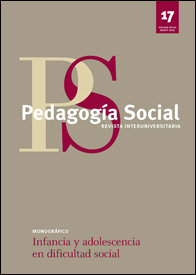El tránsito a la vida adulta de los jóvenes atendidos desde los Servicios Sociales.
DOI:
https://doi.org/10.7179/PSRI_2010.17.04Keywords:
Tránsito a la vida adulta, evaluación, jóvenes protegidos, intervención, Quebec, Path to adulthood, evaluation, youth in social services care, interventionAbstract
Los jóvenes que fueron acogidos en medios sustitutivos generalmente encuentran bloqueos importantes en sus transiciones diversas a la vida adulta. En comparación con otros jóvenes, acumulan más dificultades psicosociales y rupturas con el mundo familiar. Paradójicamente, están confrontados más a menudo con la exigencia de autonomía y de independencia.
Consciente de los problemas que plantea el apoyo a los jóvenes a la hora de finalizar su estancia en los centros de juventud cuando se aproximan la edad adulta, la Asociación de Centros de Juventud de Quebec implantó el Proyecto de Cualificación de Jóvenes (PQJ) en cuatro de estos centros de juventud de Quebec. El proyecto pretende preparar mejor a estos jóvenes para la vida autónoma, favorecer su cualificación y protegerlos mejor después de su salida. Según los promotores del proyecto, los jóvenes atendidos desde el PQJ constituyen el 10 % de los jóvenes más vulnerables de la clientela de los centros de juventud.
Nuestra pretensión, a partir de este artículo, es precisar los aprendizajes para el desarrollo de la intervención que pueden ser obtenidos desde el PQJ. A partir de la evaluación de este proyecto piloto, podremos presentar su modelo de intervención, particularmente en lo que se refiere a sus componentes distintivos de una intervención más usual. Presentaremos luego de que manera la intervención contribuye a la autonomía, cualificación y apoyo relacional. En conclusión, pondremos en evidencia los debates que provoca este proyecto, particularmente desde el punto de vista de su generalización en el conjunto de los centros de juventud de Quebec.
------------------------------------------------------------------
Youth who have been in social services care often face important obstacles on their path to adulthood. While they’re more prone to psychosocial difficulties and to family discord, Society demands they quickly become autonomous and independent.
In order to better prepare youth for their end of care, the Projet Qualification des Jeunes (PQJ) has been implemented in four youth centers in Quebec . Mindful of the specific issues they face, the project’s goal is to better prepare youth for autonomous living, to increase their employability and to better assist them after they leave care. According to the project’s promoters, the targeted population represents 10% of youth centers’ most vulnerable population.
In this article, we seek to present the lessons learned regarding intervention and its development. First, in light of the project’s evaluation, we’ll present its intervention model, and distinctive elements. Secondly, we’ll show how this intervention promotes autonomy, employability and relational support. In conclusion, we’ll discuss the challenges it poses, particularly those involving its deployment to all specialized social services in Quebec .
Downloads
Downloads
Published
How to Cite
Issue
Section
License
Copyright (c) 2014 Pedagogia Social. Revista Interuniversitaria

This work is licensed under a Creative Commons Attribution-NonCommercial 3.0 Unported License.
Copyright and right to archive
The published version of the articles can be self-archived by their authors in open access institutional and thematic repositories. However, Pedagogía Social. Revista Interuniversitaria must authorize partial or global reutilisation on new papers or publications.
Published papers must be cited including the title of the journal Pedagogía Social. Revista Interuniversitaria, issue, pages and year of publication
Ethical responsibilities
Pedagogía Social. Revista Interuniversitaria does not accept any material that has been previously published in other documents or publications. Authors are responsible for obtaining the required permissions for partial or global reproduction any material from other publications, and to correctly quote its origin.
Pedagogía Social. Revista Interuniversitaria is obliged to detect and report fraudulent practices.
Only those who have intellectually contribute to the development of the paper must appear as authors.
The journal expects authors to declare any commercial partnership that might entail a conflict of interest with respect to the submitted article.
Authors must mention in the article, preferably in the “methodology” section, that the procedures used during the samplings and controls have been made after getting informed consent.
The journal will not use any received contribution in a way other than the goals described in these guidelines.
Copyright Notice
© Pedagogía Social. Revista Interuniversitaria. Papers published in both the printed and online versions of this Journal are property of Pedagogia Social. Revista Interuniversitaria, being required to cite the source in any partial or total reproduction.
Unless otherwise stated, all content of this electronic journal is distributed under "Creative Commons Attribution-Non commercial 3.0 Spain" (CC-by-nc) license for use and distribution. The informative version and the legal text of this license is available here. This has to be expressly stated in this way when necessary.






